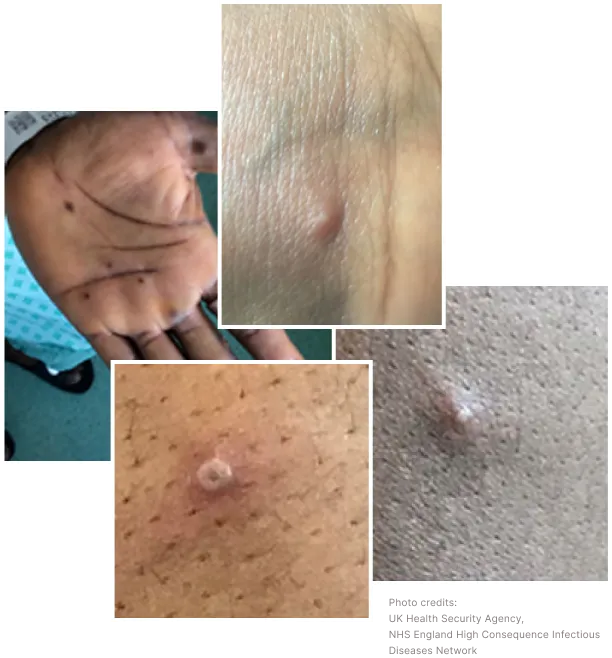WTF is
MPOX?
MPOX, formerly known as monkeypox, is spread when there is skin-to-skin contact with an infected person who has sores or scabs. MPOX can be spread through kissing or lengthy face-to-face contact, sharing towels, bedding, sex toys, or unwashed clothing.
Get tested for MPOX:

How do I know if I have it?
- Symptoms for MPOX start showing 1 to 2 weeks after being exposed to the virus.
- Symptoms can include fever, swollen lymph nodes, intense headache, muscle aches, and rash. The rash which looks like individual bumps (lesions) can develop on your face, hands, feet, genitals, or elsewhere on your body.
- Though some people have a mild rash, sometimes the rash can be very painful. You can easily spread MPOX while you have lesions.

How do I get tested?
If you think you have MPOX, stay at home until you can talk to your doctor and get tested. If you don’t have insurance or your insurance doesn’t cover the cost of testing, you can visit Health Center 1 or Mazzoni Center to get tested at low or no cost. If you have severe symptoms, go to an urgent care facility.
Uh...
How do I get treated?
- Most people recover with just rest and medication like Tylenol for symptoms. But if you have severe symptoms or are at risk for severe disease, there are medications available that may help.
- The rashes will crust and scab over after about 2 weeks. Once all scabs have fallen off, you can no longer spread MPOX.
If you think you have MPOX…
- Avoid skin-to-skin contact and kissing and avoid sharing bedding, towels, clothing, or sex toys with others.
- Inform your recent sexual partners that they may have been exposed to MPOX so they can help prevent spreading it to others.
- If you have to go out, cover rashes or sores with clothing, gloves, or sealed bandages and wear a mask over your nose and mouth.
Well...
How is it transmitted?
MPOX doesn’t spread through casual conversations, or by walking past someone. It is also unlikely you’d get it from touching a surface (like a doorknob or bus seat). However, you can get it through:
- Skin-to-skin contact with an infected person who has sores or scabs.
- Kissing or lengthy face-to-face contact.
- Sharing towels, bedding, sex toys, or unwashed clothing.
Ok...
How do I protect myself?
- Use condoms every time you have vaginal, anal, or oral sex. While condoms don’t fully protect against MPOX, they can help reduce the risk of skin-to-skin contact with bumps in the genital area.
- Talk to your provider about vaccine. Vaccine is available at Health Center 1.
WHERE CAN I GET A MPOX VACCINE?
Find a location in Philadelphia to get a MPOX vaccine. All locations allow walk-ins but you can also schedule an appointment.
JYNNEOS is a two-dose vaccine that protects against MPOX. Anyone in Philadelphia who is likely to be exposed to MPOX can get the vaccine.
People likely to be exposed to MPOX are:
- Gay, bisexual, or other men who have sex with men or transgender, nonbinary, or gender-diverse people who in the past 6 months have had any of the following:
- A new diagnosis of one or more sexually transmitted diseases (e.g., chlamydia, gonorrhea, or syphilis)
- More than one sex partner
- Individuals who have had any of the following in the past 6 months:
- Sex at a commercial sex venue (like a sex club or bathhouse)
- Sex related to a large commercial event or in a geographic area (city or county for example) where MPOX virus transmission is occurring
- People who have a sex partner with any of the above risks
- People who anticipate experiencing any of the above scenarios
Were you exposed to MPOX or have a partner with MPOX?
You should also be vaccinated:
- If you had known or suspected exposure to someone with MPOX or
- If you had a sex partner in the past 2 weeks who was diagnosed with MPOX
Vaccine should be received as soon as possible, ideally within 4 days of exposure.
Are you traveling to central or eastern Africa?
You should get vaccinated if you are:
- Visiting the Democratic Republic of Congo (DRC) or one of its neighboring countries that has confirmed or suspected mpox cases, like Burundi, Central African Republic (CAR), Congo, Rwanda, or Uganda AND you are likely to be exposed, as described above.
- Travel alone does not make someone eligible.
COMMON STIs AND OTHER INFECTIONS
Read more about the most common STIs and other infections below to know how to get tested and treated.
Syphilis is an STI that starts as a painless sore. It can cause many different symptoms including rash, swollen lymph nodes and even brain damage and blindness.
Chlamydia is an STI that may include painful urination and abnormal discharge from the penis or vagina.
Gonorrhea is an STI that causes painful urination and discharge. If untreated it may cause infertility.
Mpox is spread through close, physical contact between individuals. Symptoms can include rashes, bumps, or blisters.
Vaginitis is a term that covers multiple conditions that are not always transmitted through sex.
Hepatitis means inflammation of the liver. Hepatitis is often caused by a virus and there are many different kinds.
Human Papillomavirus (HPV) is the most common sexually transmitted infection (STI). There are many different types of HPV, some more serious than others. The good thing is that there is a vaccine to prevent many types of HPV.